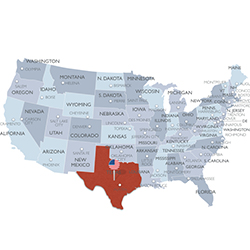Anatomy of an alleged ICO scam: Texas takes action
Chris Hamblin, Editor, London, 18 July 2018

The Texas State Securities Board has issued an emergency cease-and-desist order against various crypto-firms on suspicion of fraudulent offers of investments.
Mintage Mining is, allegedly, issuing and offering two different investments in crypto-currency mining illegally and fraudulently. It is controlled by a denizen of Utah named Darren Olayan, who is also the CEO of Symatri, which issued a new crypto-currency called Kala during a recent initial token offering or ICO. Olayan also controls NUI Social, a multi-level marketing company that purports to have more than 300,000 members in 140 countries and is involved in the offer of these investments in 'cryptos' and also supplies the pre-configured hardware that passively mines Kala. Two Texans known as McCollough and Whetsell, who are affiliated with NUI Social, have been publishing advertisements for the Olayan empire.
These advertisements have been targeting HNW and other residents of Texas. They claim that Mintage Mining "uses an advanced mining system" and "mines the right coin at the perfect time." They also claim that it uses an "advanced proprietary mining AI" that "evaluates the current crypto-currency market and strategically picks the best coin to mine." They go on to say that the average weekly rate of interest is 3-7% and the average annual rate is 180-250%, claiming that McCullough is "up 500% on [his] investment in 7 weeks" and his "uncle is up 4,000% in 10 weeks!" Finally, they claim that the business offers the "safest way to get involved in crypto" and "the safest way to make money from crypto."
There are three grades of investment membership for Mintage Mining, giving it a slightly pyramid-like appearence. Free members can purchase a fixed number of investments from Mintage Mining but many not refer new investors to it in exchange for the payment of commissions. Pro members may purchase an unlimited number but may still not gain commissions. Elite members must purchase enrolments from NIU Social and may thereafter purchase unlimited investments and Mintage Mining will pay them commissions for referring new investors to it. The firm also offers an open-ended unit investment programme. All parts of the Olayan empire tell investors that Mintage Mining (actually the trading name of BC Holdings) is 'in compliance' with the state securities laws whereas, according to the regulator, nothing could be further from the truth.
Symatri, Mintage Mining, BC Holdings, Social Membership Network Holding, NUI Social, and the three men have not obtained registration from the Securities Commissioner as dealers or agents at any time. Moreover, according to the securities board, the firms have consistently failed to disclose the names of their principals and the full details of their holding structure to the public or the regulator.
In relation to the open-ended unit investment programme, Olayan and his firms have allegedly intentionally failed to disclose the following legally necessary facts.
- Governments may frame legislation or impose regulations that may have a bad effect on the use, transfer, exchange or prices of crypto-currencies.
- Crypo-currencies are volatile.
- A system failure or another technical failure, or deficient source code, may have a bad effect on people's ability to exchange cryptos, and on the prices of those cryptos.
- A hacking incident or malicious attack might spoil trading.
- Crypto-currencies compete with one another, which might affect prices badly.
On top of this, the regulator says that they have failed intentionally to tell investors that the price of Kala is not being set by the free market, or that any such currency not listed on a crypto-currency exchange is illiquid in nature.
The regulator therefore surmises that the parties have broken s7 Texas Securities Act (by offering securities for sale without its say-so) and s12 (for not being registered). Section 23-2 of the same Act allows the regulator to make an order of this kind - which forbids the recipients to trade in securities (including cryptos) anywhere in Texas - in these circumstances. A top fine of $5,000 and a top prison sentence of two years are possible.
Meanwhile, at the federal level of American government, the chairman of the Securities and Exchange Commission has told CNBC that Bitcoin (and therefore, presumably, other cryptos) is not a security: “Crypto-currencies are replacements for sovereign currencies... [they] replace the yen, the dollar, the euro with Bitcoin. That type of currency is not a security.”
Clayton declined to say the same for etherium and ripple, however. In the meantime, a former chairman of the Commodity Futures Trading Commission has detected a "strong case" for classifying XRP (the name of the native unit of exchange used in the Ripple network to facilitate conversion between different currency types) as a security.












